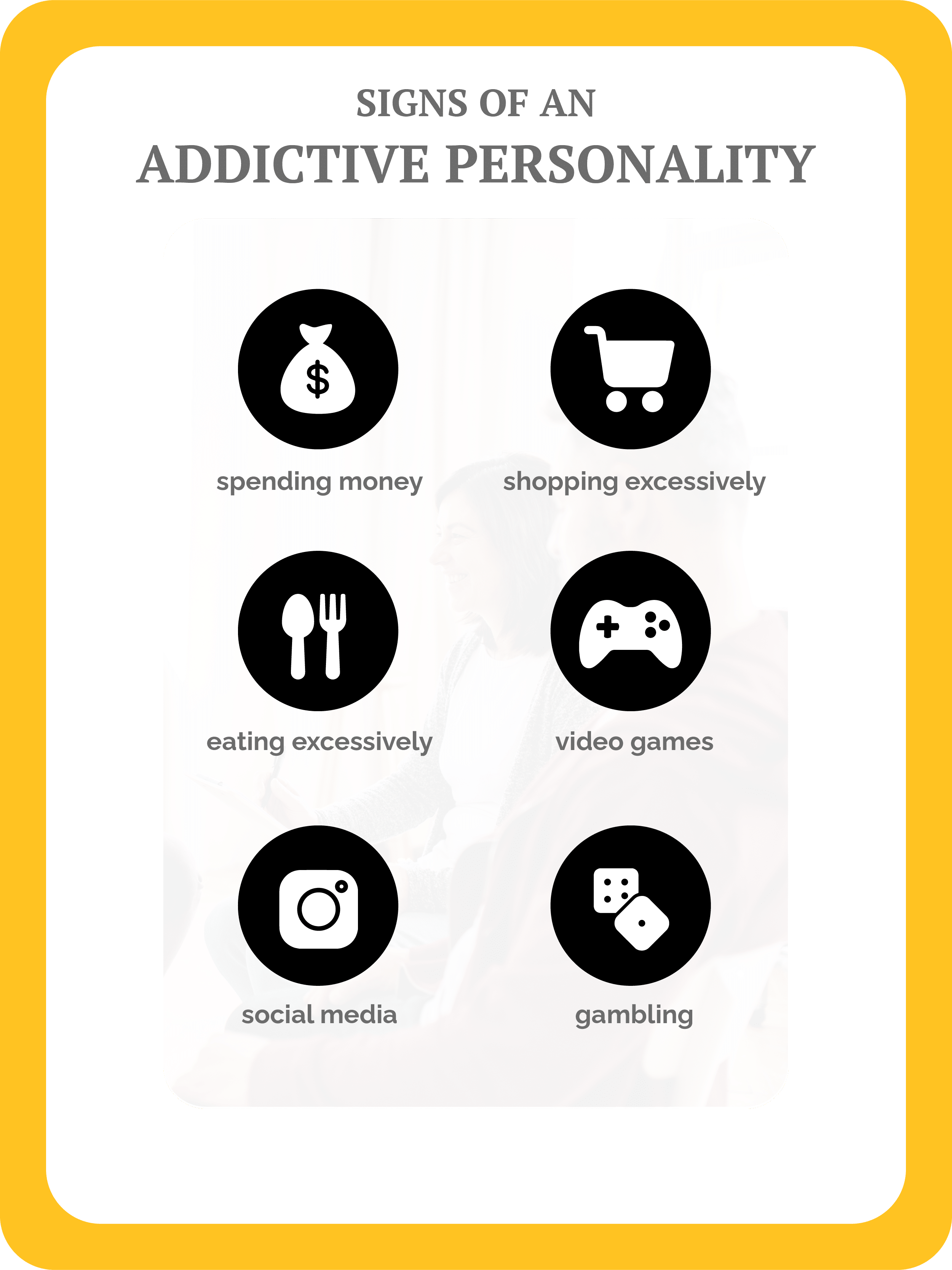Not everyone with an addictive personality becomes an addict. Although, it does make repeated substance abuse more likely. Having an addictive personality is a common character trait that tends to run in families, much like an addiction. Or more specifically, alcoholism. While facing the ups and downs of chronic substance abuse, ignoring personality traits like this could lead to future relapse.
Becoming aware of tendencies that facilitate addictive behaviors often leads toward the exposure of an addictive personality. How to deal with an addictive personality is a major part of addiction treatment, typically coinciding with addictive personality treatment. So, how do you know if you have an addictive personality?
First, you’d have to receive an accurate diagnosis, and learn how to manage it moving forward. Recognizing the signs of an addictive personality is crucial. Here is our guide to answering your question: do I have an addictive personality?
One of the greatest reasons for addiction, however, is due to genetics. The makeup of your brain can cause you to need a larger amount of stimulation. This stimulation causes you to want to use drugs or alcohol for you to feel happier or more calm.
Drugs or alcohol become the vice that brings on those desired feelings. The need for drugs or alcohol to fulfill these emotional needs starts to increase, and a habit is formed. Thus begins the cycle of addiction.
Table of Contents
- 1 What Is An Addictive Personality?
- 2 Types of Things Addictive Personalities Find It Hard To Resist
- 3 How Do You Know If You Have An Addictive Personality?
- 4 Warning Signs and Red Flags of an Addictive Personality Type
- 5 Significant Traits Used To Determine An Addictive Personality
- 6 Mental Health Conditions VS Addictive Personality
- 7 How To Cope With An Addictive Personality After Rehab
- 8 Effective Addictive Personality Treatment Program and Addiction Counseling
- 9 Miracles For Recovery Can Help You Take Control
What Is An Addictive Personality?
An addictive personality is a term used to describe individuals that frequently repeat behaviors in a chronic or compulsive pattern. However, it often goes further than that. Essentially, it’s not an initial behavior that suggests having an addictive personality, but the unwillingness to stop once begun.

Specialized therapy can help to make new connections to the feelings that arise, and introduce alternative healthy behaviors to compensate. This is where cognitive behavioral therapy is best utilized as a part of treatment.
Most importantly, it is what drives a person to behave the way they do that is most relevant. Whether driven emotionally, by fear or excitement or physically, out of chronic pain or euphoria, an addictive personality latches on. The sensation that is achieved is what keeps the individual coming back to their thoughts and actions of substance abuse.
Addictive Personality Meets Physical Dependence And Withdrawal
Together, the cycle of addiction is driven by having an addictive personality, reinforcing biological dependency, prompting the experience of withdrawal. A lot of times, what starts as “just this once,” quickly turns into a lifelong struggle with addictive personalities. So how do you know if you have an addictive personality? To start, make yourself aware of the signs. Then, determine if your behaviors compare to the findings.

Types of Things Addictive Personalities Find It Hard To Resist
The first thing to remember when examining an addictive personality is that addictions can be developed into many things. The irony is that some of the activities and behaviors may not be considered to be addictive. That is, in the sense that many don’t cause physical withdrawal when suddenly without or coming down. However, there are a few specific staples that coincide with having an addictive personality.
A few of the most notable are:
- Spending money uncontrollably
- Excessive time and funds spent shopping
- Food and eating in excess
- Video games
- Social media
- Gambling
- Substance abuse; drugs and/or alcohol
- Sex

The idea is that the behaviors harm the life of the individual. The harmful impact is what sets them apart. Because what’s to say that an individual having an addictive personality wouldn’t prefer an activity like yoga, or even fitness. Having these options available, especially during rehab for addiction, can ease into a healthier lifestyle. This is why, especially in recovery, professional treatment offers long-term solutions with individualized recovery models
How Do You Know If You Have An Addictive Personality?
During addiction treatment, there will be many opportunities to evaluate your behavior as it contributes to chronic substance abuse. In group therapy, individuals that open up about their urges are learning how to deal with an addictive personality.
For example, individuals that are more likely to become addicts or have addictive personalities, often have the following in common:
- Have other family members that suffer from addiction.
- Were raised by parents or guardians with addictive personalities.
- Have romantic relationships with partners that like similar addictive tendencies.
- Have a history of frequent mood swings or are described as “pushy.”
- Engage in thrill-seeking behaviors or are easily excited.
- Often seem obsessive and/or compulsive.
- Prefers a “quick-fix” instead of a long-term, sustainable solution.
Although having an addictive personality depends on a person’s life experience, some things can make them more prone. By keeping an eye out for red flags and motivation behind your behaviors, improvement is often possible. Addictive personality treatment while participating in addiction treatment allows for a safe environment to make positive behavioral corrections.
Warning Signs and Red Flags of an Addictive Personality Type
Again, the takeaway is that there is a difference between having an addictive personality, versus having dedication and persistence. Being enthusiastic about an interest is different, and can include many of the same activities. However, when these begin to interfere with everyday life, especially in unhealthy ways, this is cause for concern. It is especially concerning when alcohol and drugs are involved, as addiction affects the lives of everyone around them.
Some of the signs to be on the lookout for with an addictive personality include:
- Rarely feeling satisfied and always with an urge to have or do more.
- Frequently suggesting activities that revolve around the idea.
- Unfavorable outcomes rarely deter the behavior.
- Feeling as if it is physically impossible to stop.
- Behaving obsessively and acting out when unable to participate.
- Lack of respect for rules, regulations, and laws in place.
- Allowing addictive behaviors to take the place of meaningful relationships.
- Lying, cheating, or being secretive to be able to continue without hassle.
In many ways, the signs of having an addictive personality and a substance addiction are very much alike. The one way they are different, however, is that an addictive personality doesn’t always choose drugs or alcohol. Instead, it could be work, fitness, or even rehab.
In a way, this suggests that individuals with an addictive personality may be able to redirect their urges during treatment. By incorporating therapeutic techniques that rely on repetition and self-control, like recovery yoga techniques, positive outcomes are much more likely.
Significant Traits Used To Determine An Addictive Personality
There are some common traits displayed by individuals that have an addictive personality that can make addiction more likely. While this doesn’t necessarily always indicate substance abuse, drugs and alcohol usually play a considerable role.
The most common traits of those who may be if it from addictive personality treatment include:
More Likely To Lie
Having an addictive personality sometimes means having to hide the truth from others that may want to stop you. Because of this protective nature, lying becomes common and is not exclusive to any behavior specific. Even little untruths require constant attention to maintain the story. Before long, denial becomes a major part of their identity, especially when facing substance abuse dependency.
Mastering Manipulation
When an addict wants something, they will stop at nothing to work their own needs ahead of others. No matter who or how important those around them are, they will likely be subject to manipulative words and actions. Unfortunately, because the desire to get their way is so strong, they will quickly learn who and what works. Then, they will latch on to the unsuspecting few, who can assist in getting them their fix.
Gaslighting and Misplaced Blame
Unfortunately, for the others that have caught on to the manipulative agenda, it does not end there. The most effective way to ensure these goals of having an addictive personality is met is using guilt and blame. However most of the time, even the addict is unaware that this is happening. By assuming that everyone else is the problem, they have effectively removed their responsibility. Now, they can continue these addictive personality behaviors, without facing their inner turmoil.
Lack of Impulse Control
While it may be easy to argue that having an addictive personality is obvious to the individual, it usually isn’t. Most of the time they are motivated by subconscious urges, or more commonly, lack forethought. Examples of this may be to thoughtlessly take money or possessions from another, as a means to get what they want. The thoughtlessness of how this would affect the other was nonexistent, and therefore, nothing was holding them back. Another example would be getting behind the wheel when intoxicated.
Criminally Criminal
Eventually, there will be a need to ensure a steady source to acquire the funds to sustain their addiction. How to deal with an addictive personality behavior when the money runs out, usually ends with illegal activity. Whether it is stealing, cheating, or otherwise, the addict will do what they feel is necessary, especially when withdrawal looms.
This is often the case with heroin addictions. Unfortunately, it is not easy to maintain employment when the high that drives the addict is so intense. Not only that, it is highly addictive and usually leads to some major health concerns.
Thrill-Seeking Incentive
One of the major motivations behind having an addictive personality is the rush that comes with it. Usually, this starts with the desire for more adrenaline, which is achieved through excitement or fear. However, that mind-altering sensation is what becomes the craving for intensity. There is a dangerously thin line between a natural boost of endorphins, and testing the waters with addictive substances.
Although substance abuse often correlates with having an addictive personality, there may be more to the story. An increasing number of individuals seeking addictive personality treatment are suffering from underlying mental health conditions. Fortunately, intensive outpatient programs are designed to evaluate and prepare a treatment program based on specific recovery needs.
Mental Health Conditions VS Addictive Personality
Although it does have some specific criteria, the term addictive personality is not one used in the medical field. In this way, a substance use disorder is set apart, as far as being professionally recognized as a psychological illness. It is a common term used to describe compulsive behaviors, and often in a negative way.
However, just because it is not classified in the DSM-5, does not mean that therapy cannot help. Often, it’s individual therapy that begins the process of breaking some of these destructive behaviors. The one-on-one space to freely express the compulsive nature of having an addictive personality is a valuable means of treatment.
Other illnesses that are often diagnosed along with an addiction, as well as with an addictive personality include:
- Depression
- Anxiety
- PTSD
- Obsessive-Compulsive Disorder
- ADHD
When focusing on the wellbeing of an individual getting treatment for an addiction, diagnosing and treating underlying illnesses is essential

How To Cope With An Addictive Personality After Rehab
One of the best ways to deal with having an addictive personality after rehab is by staying aware of your thoughts. Practicing mindfulness has many benefits, but can also keep you aware of characteristics that you may not notice about yourself. While working to maintain sobriety in recovery, stay on guard for a few things that could suggest relapse is near.
How do you know if you have an addictive personality and are dangerously close to relapse? If any of the following sound familiar, it might be time to do some extra work on your recovery.
- Telling untruths or withholding information to avoid confrontation
- Being unable to control behaviors, urges, or reactions to triggers that lead back to substance abuse
- Continue to pursue ideas despite negative consequences
- Begin pushing loved ones away so they don’t notice
- Hear from others that your behaviors seem unhealthy and seem to be spiraling
While some of these things may be hard to hear, they may be indicators that further addictive personality treatment is needed. This doesn’t always mean repeating the entire program, or that partial hospitalization programs are necessary at this time. However, following up at the first sign of trouble could save you from more trouble down the line.
Effective Addictive Personality Treatment Program and Addiction Counseling
When participating in rehab for addiction, it is important to be evaluated for personality traits that can have an impact on sobriety. It will only benefit your cause to ensure that the outpatient treatment programs have the available capacity to provide care. Not only that, but underlying mental health disorders that go undiagnosed go on to encourage relapse later on in recovery.
Substance abuse and addiction is the type of illness that gets worse the longer that it can continue. The very same is true about having an addictive personality, despite the behavior, and has serious mental health effects. Learning how to deal with an addictive personality is what rehab is all about. Taking the time to invest in yourself and make quality changes to benefit your future gives you back control.
Miracles For Recovery Can Help You Take Control
Having an addictive personality can make you feel like you have lost control. Learning how to deal with an addictive personality can give you back your confidence on the way to recovery. If you or someone you love is struggling to get sober, Miracles Recovery is only a call away.
How do you know if you have an addictive personality that is keeping you from living a healthy sober life? Where can you get addictive personality treatment and counseling to overcome addiction? Miracles Recovery has all that you need to get started and begin making consciously healthy decisions about your future wellbeing. The only question now is why wait? Contact us today to find out about getting started.
References:
https://www.nature.com/scitable/blog/mind-read/do_you_have_an_addictive/
https://www.ncbi.nlm.nih.gov/pmc/articles/PMC3996683/
https://www.ncbi.nlm.nih.gov/pmc/articles/PMC3506170/

